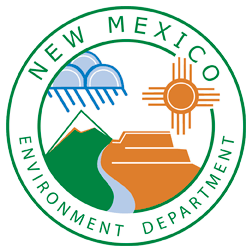Recycling
Recycling programs vary from community to community in New Mexico. Please contact your local municipal, county, solid waste authority, or tribal recycling program to find out what and how to recycle in your community.
A directory of recycling programs in the state is available at the New Mexico Recycling Coalition website.
New Mexico Recycling and Diversion Rates
Recycling and diversion rates are calculated from the weight of materials reported annually by regulated solid waste, recycling, and composting facilities only.
The recycling rate is calculated by dividing all in-state generated recycled materials, by all in-state generated municipal solid waste (MSW) totals. Included in the MSW stream is normal household waste and commercial waste, glass, lead-acid batteries, white goods, paper, plastics, textiles, tires, wood, yard trimmings, and other waste. MSW does not include out-of-state waste, C & D, clean fill, industrial waste, infectious waste, and other special waste.
The diversion rate in New Mexico includes all materials recycled plus materials beneficially used. The diversion rate is calculated by dividing all in-state generated recycled and beneficially used material, by all in-state generated MSW, C & D, clean fill, and divertible special waste (sludge, PCS, etc.) totals.
- 2015 Recycling and Diversion Rate
- 2014 Recycling and Diversion Rate
- 2013 Recycling and Diversion Rate
- 2012 Recycling and Diversion Rate
- 2011 Recycling and Diversion Rate
- 2010 Recycling and Diversion Rate
Electronic Scrap
Used electronic devices may be accepted for refurbishment or recycling at retail locations or in community recycling programs in New Mexico. The Solid Waste Bureau, as well as the U.S. EPA, recommends use of programs that conform to e-Stewards® and/or R2 certification standards.
Other Resources
Fluorescent Bulbs
Compact fluorescent bulbs (CFLs) contain mercury and should be recycled or disposed properly. Fluorescent bulbs from a household may be accepted in a local community’s household hazardous waste program; check with the municipal, county, solid waste authority, or tribal government program in your area. In some communities, retail stores that sell fluorescent bulbs may accept used bulbs for recycling. Fluorescent bulbs from a business or institution may be recycled through a mail-back service.
Other Resources
- Cleaning Up a Broken CFL
- Recycling and Disposal of CFLs and Other Bulbs that Contain Mercury (for households)
- Establishing a Recycling Program for Mercury-Containing Light Bulbs (for businesses)
Composting
Composting is a form of recycling in which waste organic materials are converted to a valuable soil amendment product known as compost. Some New Mexico communities have composting programs that accept organic materials such as yard trimmings and food scraps from businesses, institutions, and the public. Contact the solid waste management division of your municipality, county, solid waste authority, or tribal government for information on the composting program in your community.
Other Resources
- Find a Composter
- Backyard Composting Made Easy
- Facilitando la Compostacion Casera
- New Mexico Organics Recycling Organization
- For composting facilities:
- Composting Facility Registration Application
- NMED Ground Water Quality Bureau Notice of Intent to Discharge form
- NM Department of Agriculture Soil Conditioner Registration information
- NM Department of Transportation Standard Specifications for Highway and Bridge Construction (see section 632.2.5, composted mulch)
Household Hazardous Waste
Household hazardous waste (HHW) includes cleaners, solvents, automotive fluids, batteries, garden chemicals, and other materials that pose hazards to solid waste workers and the public. Proper disposal is necessary to prevent injury, illness, or environmental contamination. To dispose of household hazardous waste safely, contact the municipal, county, solid waste authority, or tribal government program in your community.
Other Resources
Used Needles
Used needles (known as “sharps”) pose a risk to solid waste and recycling workers and the public if not properly disposed. Some communities have used needle collection sites, but if yours does not, used needles from households may be safely disposed in the regular trash sent to a landfill.
- Do place used needles from a household in a rigid plastic container that has a lid (such as an empty laundry detergent bottle). Add a small amount of bleach. Place the lid on the container, seal the container with tape, and place it in the trash.
- Do NOT place used needles in recycling bins.
- Do NOT place loose needles in trash bags or carts.
Medical facilities should dispose of used needles as regulated infectious waste, within leak-proof, rigid, puncture-resistant containers which are manufactured for the purpose of sharps containment, and not in the regular trash.
Other Resources
- Community Options for Safe Needle Disposal
- Protect Yourself, Protect Others: Safe Options for Home Needle Disposal
Pharmaceuticals
Pharmaceuticals may be disposed through local take-back programs. Please contact your local drugstore, law enforcement agency, fire department, hospital, clinic, or public health office to find out whether pharmaceutical take-back services are offered in your community.
Pharmaceuticals should never be flushed down the toilet or drain.
Other Resources
Clean Fill
The New Mexico Solid Waste Rules define clean fill as follows:
“Clean fill” means broken concrete, brick, rock, stone, glass, reclaimed asphalt pavement, or soil that is uncontaminated, meaning the fill has not been mixed with any waste other than the foregoing and has not been subjected to any known spill or release of chemical contaminants, including petroleum product, nor treated to remediate such contamination; reinforcement materials which are an integral part, such as rebar, may be included as clean fill; clean fill must be free of other solid waste, to include land clearing debris, construction and demolition debris, municipal solid waste, radioactive waste, hazardous waste or special waste.(20.9.2.7.C (4) NMAC)
Clean fill does not require disposal in a permitted landfill, but may be deposited elsewhere as long as the material is managed in a manner that does not create a public nuisance or potential safety hazard, or adversely impact the environment; is not placed in a watercourse or wetland unless appropriate permits are obtained; and is covered with two feet of clean earth within 30 days after being deposited, unless the clean fill material is clean soil, or unless a longer period or alternative material or depth is specifically approved by the department. (20.9.2.8.H NMAC)

